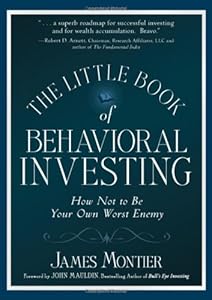Paul J Meyer said, “Productivity is never an accident. It is always the result of a commitment to excellence, intelligent planning, and focused effort.” This is a universal truth. Yet we forget it time and again because of a myopic perspective. Investments are inherently going to peak and slump. It’s part of the game. But if we focus on immediate outcomes and change our investment process, we miss out on the gold mine at the end of the longer, more winding road.
This is James Montier’s point of discourse in the 16th and final chapter of The Little Book of Behavioral Investing: Process, the one thing we can control.
Performance is a dicey thing. For one person, performance could be about winning all the time. For another, it could be losing today but winning tomorrow. When it comes to investing, the second approach can take you far. Focusing on the short-term and expecting to win all the time would not only be unrealistic but also catastrophic to long-term financial goals.
Consider baseball. The performance of teams is not measured on each win or loss. A season with 60% wins is celebrated. In the same vein, Las Vegas casinos are not worried about one-off losses. Their eye is set on average profit, the longer haul. They have the betting process so perfected that they can afford a few losses here and there. The process works! To perfection.
So why should investors or their clients expect wins every time? It’s naive. And unwise. Yet, investment processes are tweaked every day or week for small winnings that’ll keep outcome obsessed clients’ happy. It can be a gamble investors make to stick with their jobs. Or it can just be a lack of vision.
Nothing can escape the truth of Russo and Schoemaker’s simple matrix on outcomes and process:
| Good outcome | Bad outcome | |
| Good process | Deserved success | Bad break |
| Bad process | Dumb luck | Poetic justice |
Does a good process always work? No. A good process can lead to good and bad outcomes. That’s because outcomes are affected by luck and circumstances, things we can’t control. But if the process is sound, it will work in the long-term, overriding short-term misses.
Does a bad process always fail? No. And that’s worse than a good process falling short. When a bad process returns a good outcome, all people see is the outcome. Not many analyse the win or honestly admit that it had nothing to do with their skills or intellect. Or worse, the win may not be analysed at all. Investment strategy could be altered on the basis of the onetime fluke, for catastrophic results.
Following an outcome-based strategy is fatal to investors. Outcomes are too unstable. For example, it is possible to be right over a five year window but wrong in a six month view. Price volatility could change outcomes completely.
Outcomes lead to another problem – skewed judgement in hindsight or outcome bias. People will judge the soundness of past decisions on the basis of outcomes. If a strategy fails (and even the best can, for unpredicted reasons), it is condemned along with the decision maker. If the strategy proves successful, there’s a war over who deserves credit. You see this happening in parliament all the time.
The outcome bias is why people are afraid of taking decisions that don’t return immediate results. Ruling political parties exhibit this behaviour quite often. Rather than taking the best approach to solve problems, they select the shorter route to please people; even when they know that the long-term repercussions will be disastrous. Price controls are a perfect example of such flawed strategy.
The same outcome bias applies to investors. The apprehension of being held accountable for outcomes leads to substandard choices that guarantee certainty, compromises on product quality, wasted time, and risk and loss aversion. If we remove outcome accountability and replace it with process accountability, the decisions of investors become far more astute.
The right approach therefore is to focus on process rather than outcome. A process that focusses on long-term goals could fail in the short-term but that’s alright. The time to tweak investment methods is when you are most successful, not when you see under-performance. This is John Templeton’s advice to investors.
So next time things look bleak, don’t start doubting your investment decision. If your focus was long-term, have the patience and grit to stick to your guns.
Monica Samuel is doing a chapter-wise review of the book: The Little Book of Behavioral Investing: How not to be your worst enemy by James Montier. You can follow the series by following this tag: tlbbinvesting or by subscribing to this rss feed: tlbbifeed

